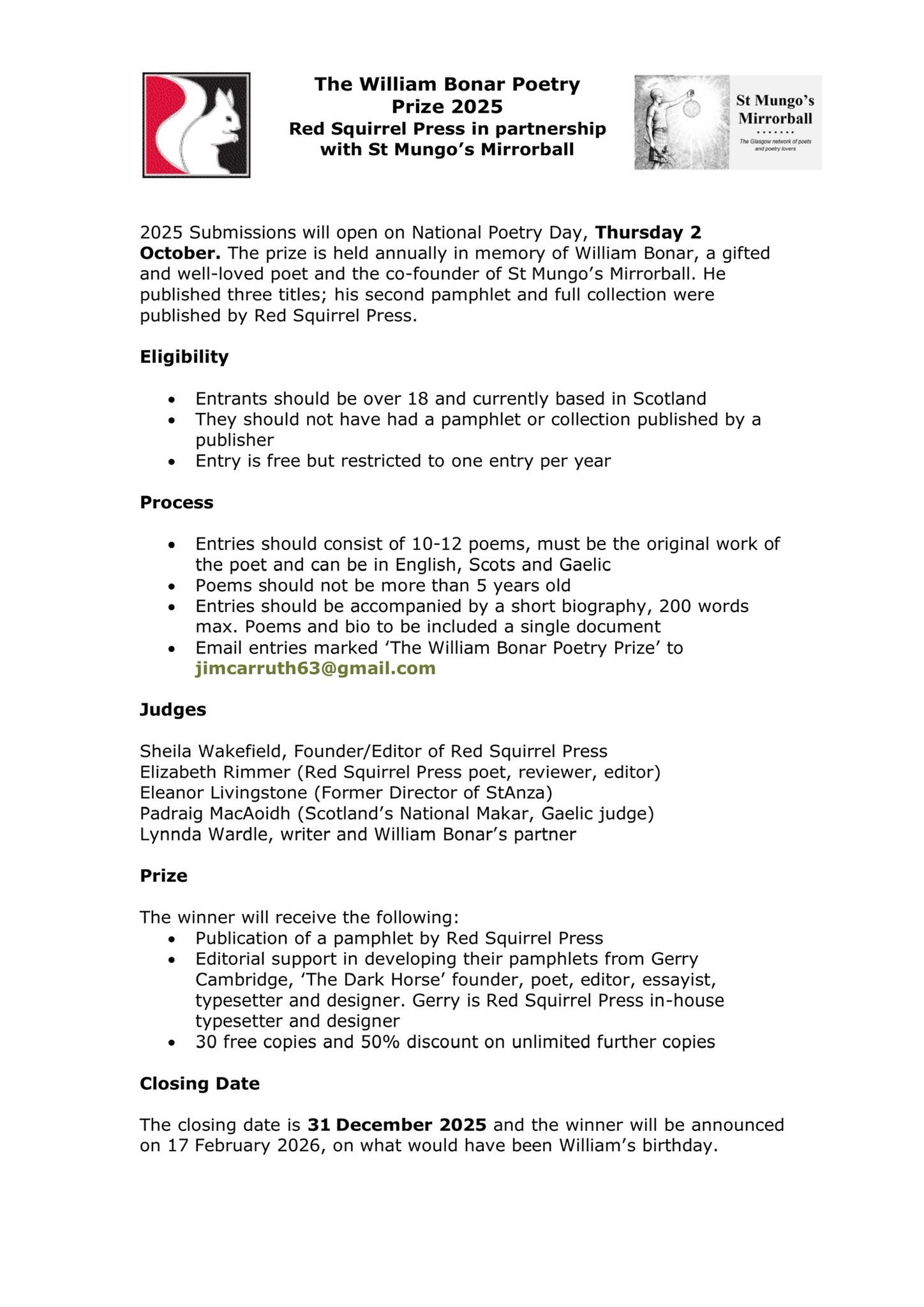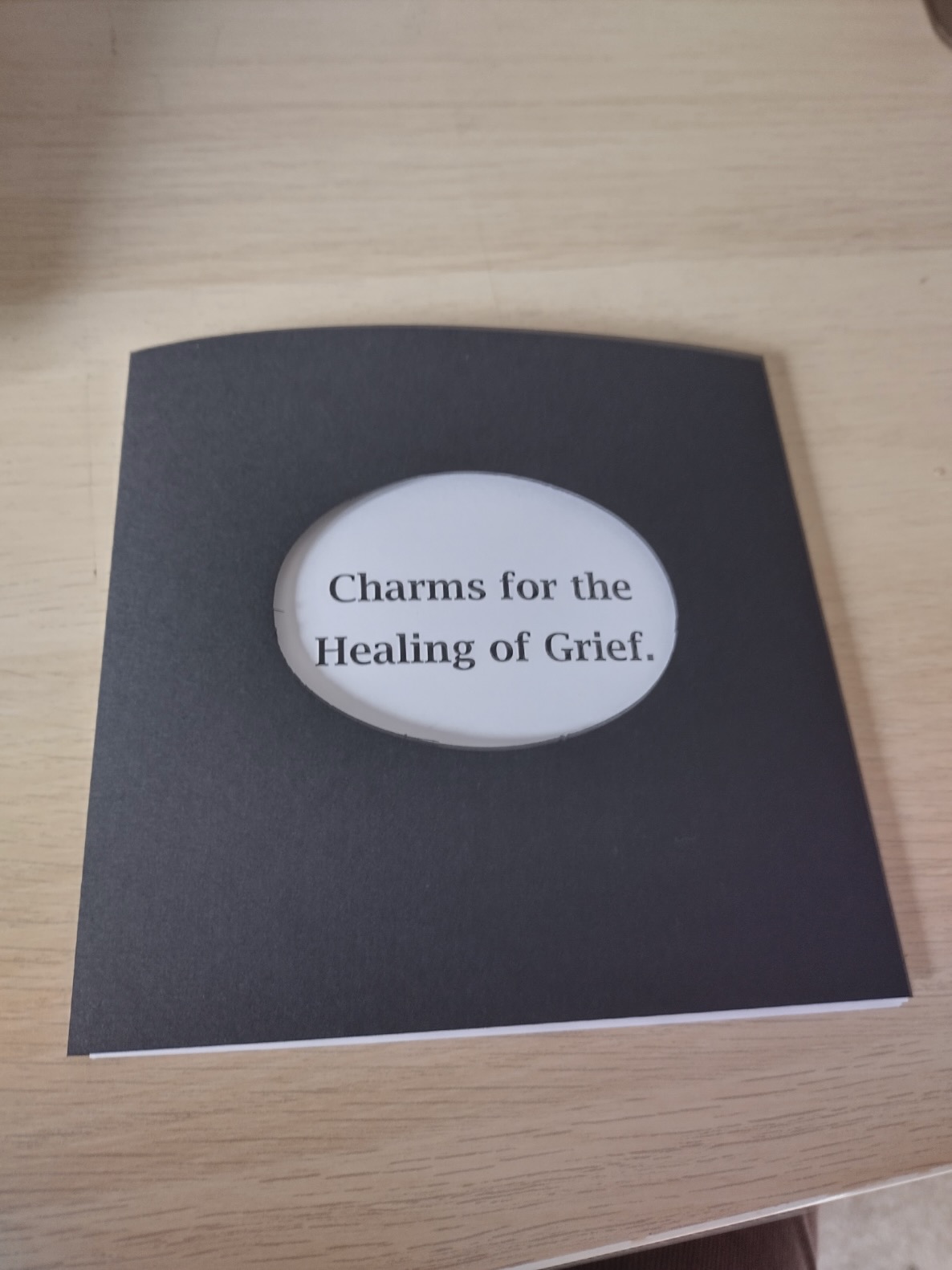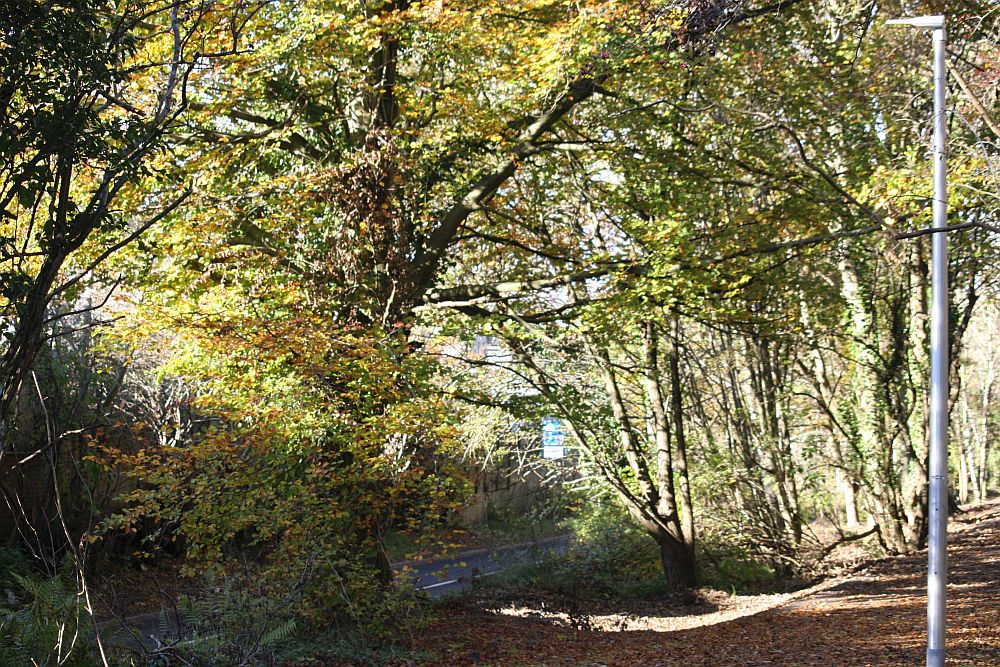William Bonar Poetry Competition
October 7, 2025 Reading time: ~1 minute
It is my great pleasure to be one of the Judges for this exciting competition. William Bonar was one of the best poets I had the privilege of editing before his untimely death, and also one of the very nicest and wittiest men in poetry.
The prize is really worth having. Partial though I may be, Red Squirrel Press publications have a reputation for the highest production values, and I have known poets weep with delight when they first see the design Gerry Cambridge has come up with for their work. (An example, I nearly cried myself when I found the wee wren hiding in the pages of Haggards.) As an editor himself, having produced The Dark Horse poetry magazine for many years, he needs no introduction, and anyone would benefit from his advice in starting a poetry career.

Charms for the Healing of Grief
September 30, 2025 Reading time: 2 minutes

The big news this week is that the manuscript of Comrades of Dark Night is finished and away to the publisher for consideration. All being well it will be out in March, and there will be a lot of promotion posts over the next few months, with news of launch events and readings and so on as details become available.
The text of the Charms poems will be in it, and we have permission to use some of the glorious artwork by Hugh Bryden, so people who didn’t buy the limited edition won’t miss out too much. However, I do have four copies left, and I would like to sell them in aid of the Palestinian Heirloom Seed Library in Lebanon. News from Gaza is hard to come by and hard to hear, but a significant moment of loss was the destruction of the Seedbank in Gaza. I wrote about it here, and if you read my earlier blogpost Of Herbs and Poetry, you will see how profoundly this issue concerns me.
Copies cost £12 and all proceeds from sales will go to the seed library. There is £3 p+p but if you are in Glasgow I will get it to you by hand.
Some Geekery
September 17, 2025 Reading time: 2 minutes
There are fewer gaps on those shelves now, and I’ve even reached the point of adding layers, but what are you going to do when the world is full of interesting people writing so much inspiring stuff? One of the main reasons for reviving tis blog was so I could point anyone who might be interested in the direction of my latest discoveries, so here we go.
Misleadingly, it’s all online this time. First is a long and heavily academic article by James Paz: Storm-thoughts and ice-songs:
A creative-critical response to Old English eco-poetry
This is one for geopoetics people, eco-poets or fans of Old English poetry. It deals with the attitude of early English writers to the natural environment, pointing out that the modern division of ‘human’ and ‘natural’ didn’t really exist, and seeing the human psyche ‘imbricated’ in the natural world, shaped by it and responding to it in a way that is very different from our use of nature as metaphor. It reminds me of Lorca’s understanding of ‘duende’. For a working poet, it disappoints that he doesn’t make much comparison with the practice of contemporary poets, though Alice Oswald gets a mention. Susan Richardson and Jen Hadley have a lot to contribute to this topic – and of course, I’ve written relevant poems and discussed it a little myself! All the same, this article is grounded in a wealth of thinking and writing that I will be following up for a long time.
Then a blog from an artist known as Quinie. She is a multi-disciplinary artist and singer who sings Scots song and makes work exploring language, landscape, tradition, identity, and alternative histories. She has a record (yes, really, a vinyl LP) out called Forefolk, Mind Me, exploring travellers’ songs and the tradition of diddling and canntaireachd, but her blog is also a fascinating discussion of music, culture, tradition and place. The album is fab too.
A Web of Speaking Beings
September 17, 2025 Reading time: 4 minutes
I am fairly sure that my understanding of Melanie Klein's definition of humans as speaking beings is superficial, and I may well have taken it in a completely unwarranted direction, but the notion that humans are meant to communicate, that we derive our sense of purpose and direction and meaning from a dialogue with our fellow-creatures, and that we get our concept of identity by telling our story, and (crucially) hearing a response, is massively important to me.
There are times, of course, when silence, restraint, humility and compassion require that we don't just blurt out what's on our minds, but this too, can be a way of shaping a dialogue and building a story. What's happening now is something else entirely. It is, of course, primarily about political control, and shutting down the kinds of conversation that unsettle power-bases. But it's more fundamental than that. It is not just that corrupt powers want to control how the rest of us behave, or how we see the world. It is an attack on the very foundations of language itself, and therefore on what it means to be human.
The banning of specific words is mostly a device to enable computers to identify documents to delete quickly, without involving a human decision or understanding at any level. It leads to idiocy like the deletion of the account of Hiroshima, because the document referred to the name of the bomb, Inola Gay, and 'gay' is banned. But more than that, without awareness of nuance, context, emotion, humour, the development of language as a living thing, the way we often code our language to convey more than the dictionary can hold, AI destroys the very matrix of communication. The human is no longer able to exercise its power as a 'speaking being' and we are about as meaningless as a speak your weight machine.
Under the banner of language, I would also include art, music, and all forms of sensory learning, but as a poet, I find that words are really where this hurts. John Burnside, in his introduction to The Music of Time, points out how important poetry is. 'Poetry refreshes the language, strengthening it against the abuses of the unscrupulous and the careless, and allowing it to retain its ability to enchant, to invoke and to particularise' (p10). he talks a lot about precision of language preserving respect for truth, and the quest in poetry to widen our awareness of experience so as to name, understand and heal. For a poet, this attack on language is pretty drastic. We are your canaries in the mine.
I can see that my next collection will have to go into this more. But meantime, this book, which is almost done, will contain this:
A Hymn for Bad Words
This is a hymn for the bad words,
not the words used to abuse, words
spoken in anger or cruelty - Bad Words -
words like gay, like equality, like woman,
like climate, like inclusion, like black.
These are words that will get you banned,
defunded, your pictures covered
with brown paper, your jobs gone overnight.
This is a hymn for empathy, welcome,
a hymn for Mexico, Denali, history, acorn
and bluebell, for bats and newts, for Gaelic
on signposts and Welsh on railway stations,
words to frighten the powerful, words of strength
that put songs in the heart, and hope -
all the lost words that might summon kindness,
curiosity, honesty, joy, diversity and difference.
I summon you, solitude, silence,
listening, frugality, patience, thought.
Bring wisdom of quiet places, shared sorrow,
and hands reached out to help.
Bring pauses to deliberate, bring hope.
Bring humble apology, mending of mistakes.
Bring the building of bonds between hearts.
Bring honour for truth, bring courage, bring love.
Hauntings - Living in Ancient Landscapes
September 17, 2025 Reading time: 3 minutes
This landscape is, to be frank, no more – or less – ancient than the rest of Britain. And, given the fact that the house we live in is less than ten years old and building the estate is still going on, you might think this should be designated a brand new landscape, but I’ve never been so aware of the history of place, so haunted by the past as I am here.
The estate is still raw, and built on what was agricultural land, so I don’t get the archaeology of broken china or clay pipes that I used to find in my previous garden, only builder’s rubble and debris. But this area has been continuously occupied since neolithic times, and has had more reinventions than Troy, which Emily Wilson says was destroyed and rebuilt nine times, and there are traces of all kinds.
The first is the plants coming up in the lawn from when it was grazed land – mouse-ear chickweed, red and white clover, plantain, mugwort, and woundwort. This is a different mix from what I was used to, but it shows that there was grass here long before the houses. In fact local poets wrote a lot about green fields, rabbits and picking flowers on our hill. But not so far away, lower down than here, there were woods, and sacred wells, barrows, cairns and traces of druids in place names and quiet spaces that have somehow been left untouched.
You can trace them by place names – streets, parks, districts. Some of them reflect industries that have come and gone – mining, railways, electronics, farming and market gardening. There used to be bleaching fields for linen, orchards underplanted with berry bushes in a way that was unique to this area. There are still rogue apple trees and wild berries along the Clyde, railway tracks converted to walking trails and nature reserves. There are still Victorian houses, too grand for modern day living, and converted into flats with their remnants of status gardens, their pleached lime avenues and shrubberies. There are structures with memories of civic pride, the first public park ‘built at the expense of all, for the enjoyment of all’, with its ravine and a small amphitheatre recalling the Lang Wark – a revival meeting of a scope to rival an evangelical missionary’s stadium tours – and an imposing stone-built Institute where evening classes are still held. there are planty of churches, some named after saints who lived and worked here – Cadoc, Columcille, Mungo. And some things that were lost have come back – thrushes and blackbirds have returned to the garden, now there is more greenery for cover, bees and butterflies have shown up after the devastation of last year’s poor summer.
We are no longer the generation that would flatten a neolithic barrow to build a golf course. This is a place where the past is remembered and restored – oral histories, facebook heritage groups, but more to the point when I come to write, it is present. It reminds me how much destruction there has been, that I am not the first and won’t be the last to write here. The story of the ghost of King Caw, looking over the shoulder of St Cadoc as he built his monastery judges this generation as we build, as we work, as we come and as we will one day go.

The Dominion of Mercury
September 17, 2025 Reading time: 4 minutes
Three and a half years ago I moved here from a shady garden, with deep fertile soil, rather damp, rather acid, and I’ve had to adjust to something very different here. It turns out that this garden is, as Culpeper might have put it, ‘under the dominion of Mercury’. Mercury’s plants tend to do well here, for reasons I don’t yet fully understand. The soil is good to heavy, but with a lot of stones in it, not just builders’ rubble and hard core, though there’s plenty of that, but ‘coal measures’ – layers of mudstones and limestone shale above the seams of coal that defined this area until fifty years ago. There is sun, some fertility, but not too much, shelter from the prevailing winds, and enough rain, which they like. As herbs, they tend to be nervines, picking up magnesium from the soil, and therefore good for the nervous system, the brain, memory, coughs and, often, digestion. This garden loves lily of the valley, southernwood, elecampane, lavender, fennel and winter savory, and they thrive here, where many of them struggled in my previous garden.
It is easy to see why they are ascribed to Mercury – the intelligent, volatile, lively and ingenious god of language, communication and creativity – the god of the mind. Mercury has a difficult persona – as a god, he’s a trickster, a shapeshifter, notorious liar, ingenious, dangerously fluent and persuasive, and frankly, about as endearing as Dominic Cummings. And yet. He is the trusted messenger of the gods, the guardian of travellers, protector of herds and herdsmen. His dual personality reflects what was discovered about the planet through history. It is closest to the sun, and the fastest mover – the Assyrians called it ‘the jumping star’ and the Greeks called it ‘Stilbon’ the sparkling star, because of its flashy volatility. It was seen only at evening and morning, which meant that for a long while there was uncertainty about whether it was even one planet or two so Mayans represented it as twin owls one for morning and one for evening. The metal called after him is anomalous, a metal that rolls around on a flat surface like a ball, that divides and rejoins like water, a liquid that isn’t wet. It’s not surprising, then, that when alchemy was extensively studied, Mercury became associated with the process of transition and transformation, forming a triad with the sun and moon. Sun herbs like marigolds and rosemary and moon herbs like mugwort and vervain do well in this garden too.
Mercury appears to have had an older presence, before he was shown as the tricksy boy. He was represented as a standing stone, or a heap of stones usually at a boundary, and may have been thought of as the duende – a spirit of place, with its ambivalent overshadowing presence, sometimes kindly, sometimes punitive, incorrigibly untameable and alien. He is like the Viking concept of ‘luck’ – while it’s with you, everything is fine, but if it’s against you, you are ‘ogiftumađr’, the unlucky man, a Jonah, and nothing will go right. He is the bwbach, the broonie, the trowie, the good neighbour, one of the fair folk, sometimes a pharisee, or a saracen. He is the stranger, the unpredictable other, the one who may be dealt with for good or ill, but never completely trusted. When Mercury goes retrograde, people get very conscious of trains being cancelled, letters lost in the post, computers crashed, fallouts and misunderstandings betweeen friends and families.
I’m haunted by Shakespeare’s line ‘the words of Mercury are harsh after the songs of Apollo’(Love’s Labour’s Lost). A pairing off of lovers is halted by news of the death of the Princess’s father, and the happy ending has to be postponed while the feckless students and frivolous maids grow up. It is one of a few Shakespeare references to the ephemerality of art, especially theatre, possibly inviting us to dismiss it as a shadow (A Midsummer Night’s Dream) or a jest (Hamlet), compared with the serious nature of real life. But it’s more complicated than that. Mercury invented the lyre for Apollo, and says there is no god he will honour more. Words and music intertwine in both poetry and song, performance and communication. Heart and head, feeling and technique have to come together for art to do its job. Despite his propensity for lying, Mercury introduces us to the hard truths that precipitate growth, change and ultimately a negotiation with reality that leaves us in a better place.
Moving to ‘the dominion of Mercury’ sparked new relationships with the earth, with my neighbours, and with the unfamiliar reaches of myself – and a lot of new poems. Look for bats, ghosts, foxes, druids, rivers, music and herbs. The book is due out in March 2026, and I’m excited about it.